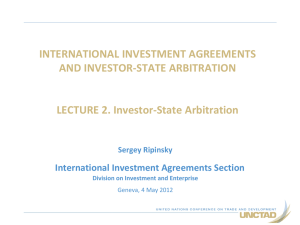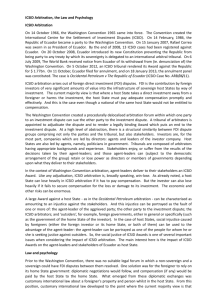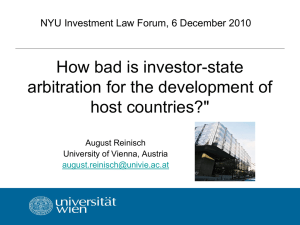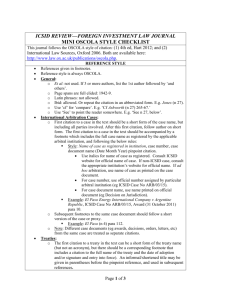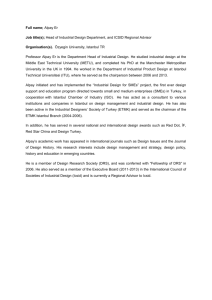applicable law in investor-state arbitration
advertisement
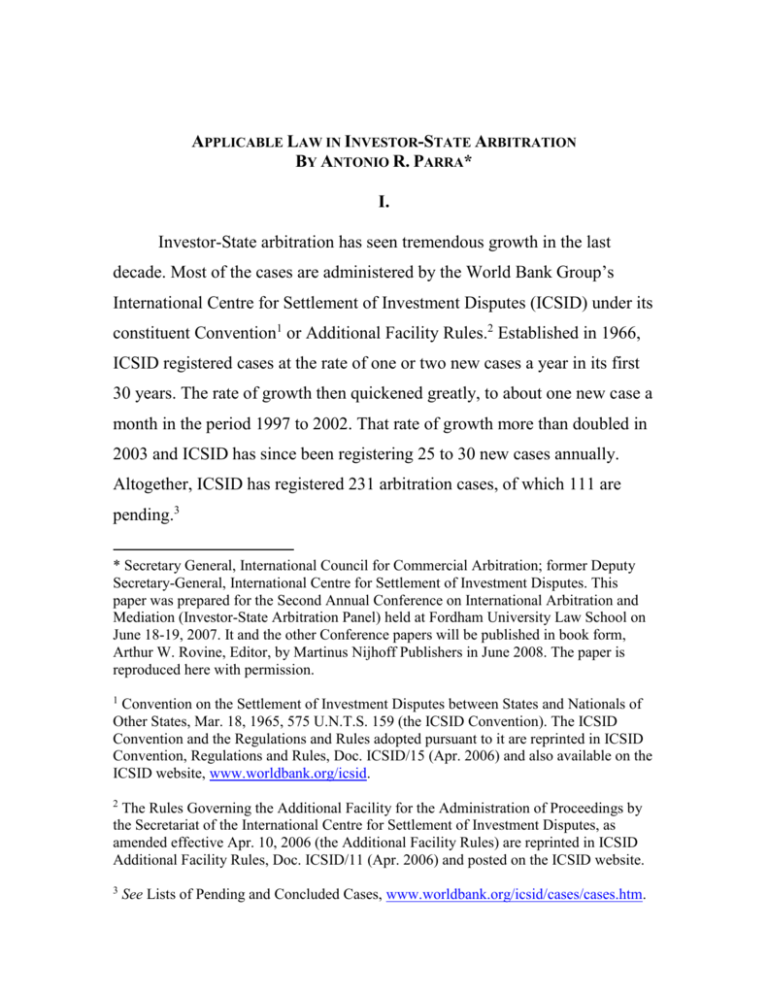
APPLICABLE LAW IN INVESTOR-STATE ARBITRATION BY ANTONIO R. PARRA* I. Investor-State arbitration has seen tremendous growth in the last decade. Most of the cases are administered by the World Bank Group’s International Centre for Settlement of Investment Disputes (ICSID) under its constituent Convention1 or Additional Facility Rules.2 Established in 1966, ICSID registered cases at the rate of one or two new cases a year in its first 30 years. The rate of growth then quickened greatly, to about one new case a month in the period 1997 to 2002. That rate of growth more than doubled in 2003 and ICSID has since been registering 25 to 30 new cases annually. Altogether, ICSID has registered 231 arbitration cases, of which 111 are pending.3 * Secretary General, International Council for Commercial Arbitration; former Deputy Secretary-General, International Centre for Settlement of Investment Disputes. This paper was prepared for the Second Annual Conference on International Arbitration and Mediation (Investor-State Arbitration Panel) held at Fordham University Law School on June 18-19, 2007. It and the other Conference papers will be published in book form, Arthur W. Rovine, Editor, by Martinus Nijhoff Publishers in June 2008. The paper is reproduced here with permission. 1 Convention on the Settlement of Investment Disputes between States and Nationals of Other States, Mar. 18, 1965, 575 U.N.T.S. 159 (the ICSID Convention). The ICSID Convention and the Regulations and Rules adopted pursuant to it are reprinted in ICSID Convention, Regulations and Rules, Doc. ICSID/15 (Apr. 2006) and also available on the ICSID website, www.worldbank.org/icsid. 2 The Rules Governing the Additional Facility for the Administration of Proceedings by the Secretariat of the International Centre for Settlement of Investment Disputes, as amended effective Apr. 10, 2006 (the Additional Facility Rules) are reprinted in ICSID Additional Facility Rules, Doc. ICSID/11 (Apr. 2006) and posted on the ICSID website. 3 See Lists of Pending and Concluded Cases, www.worldbank.org/icsid/cases/cases.htm. Underlying these developments have been great expansions of world investment flows and an accompanying proliferation of bilateral and multilateral investment treaties since about 1990. There are now an estimated 2,500 bilateral investment treaties (BITs) involving some 170 countries.4 Most of these treaties provide for the ICSID arbitral settlement of covered investor-State disputes. Many also, or instead, refer in this context to other forms of arbitration, such as arbitration under the Arbitration Rules of the United Nations Commission on International Trade Law (UNCITRAL).5 Similar provisions may be found in such multilateral treaties as the North American Free Trade Agreement (NAFTA)6 and the Energy Charter Treaty (ECT).7 The overwhelming majority of the many new investor-State arbitrations have been initiated on the basis of such treaty arrangements. Thus, 100 of the 111 cases now pending at ICSID were brought to the Centre under BITs, the NAFTA, or the ECT. It is pleasant to recall, at this conference hosted by Fordham University Law School, that ICSID and the ICSID Convention, which have been so central to these developments, were the creation of a Fordham graduate, Aron Broches. As General Counsel of the World Bank, he proposed the ICSID initiative to the Bank’s management and Boards; he was 4 See United Nations Conference on Trade and Development, Bilateral Investment Treaties 1995-2006: Trends in Investment Rulemaking, UNCTAD/ITE/IIA/2006/5, at xv (2007). 5 United Nations Commission on International Trade Law, UNCITRAL Arbitration Rules, U.N. Doc. A/3/17 (1976). 6 North American Free Trade Agreement, Dec. 8-14, 1992, 32 ILM 289 (1993). 7 Energy Charter Treaty, Dec. 17, 1994, 34 ILM 360 (1995). 2 the main drafter and negotiator of the ICSID Convention; and he became the first Secretary-General of ICSID. Broches received his LL.B from Fordham in 1942. He then joined the staff of the Washington Embassy of his home country, the Netherlands. In 1944, he served as Secretary of the Netherlands Delegation at the conference at Bretton Woods that led to the establishment of the World Bank and International Monetary Fund. He joined the Bank’s Legal Department in 1946, becoming its Director 10 years later and General Counsel after another three years. At the Bank, he played a prominent role in laying the legal foundations for the Bank’s operations. Approaches that he helped to pioneer for such issues as the governing law of Bank loan agreements have since served the Bank well and have been adopted by other development finance institutions. Also innovative were the approaches that Broches devised for the ICSID Convention in regard to the law applicable to the merits of the dispute.8 This paper discusses this aspect of arbitration under the ICSID Convention, hoping to show how well Broches’s approaches have stood the test of time and shown themselves adaptable to the great changes we have seen in investor-State arbitration. II. The principal provisions of the Convention on applicable law are in Article 42(1). It consists of two sentences. The first gives the parties full 8 The varied interests and achievements of Aron Broches are well reflected in the invaluable collection of his writings: A. Broches, Selected Essays: World Bank, ICSID, and Other Subjects of Public and Private International Law, with a foreword by S. Schwebel (1995). 3 autonomy in regard to the selection of the law applicable to the merits of their dispute. It directs an arbitral tribunal constituted under the Convention to decide the dispute “in accordance with such rules of law as may be agreed by the parties.” The formula “rules of law” rather than “the law” applicable to the merits has since also been adopted for such other instruments as the UNCITRAL Model Law on International Commercial Arbitration.9 The formula makes it clear that the parties may agree not only that their tribunal will apply a domestic law or international law but also, among other possibilities, combinations of domestic and international law rules. There is no requirement that the parties’ agreement on applicable law be express. As was said during the drafting of the Convention, a tribunal may also be bound by “an implicit agreement which could be deduced from the facts and circumstances of the relationship between the parties.”10 In the absence of party agreement on applicable law, the UNCITRAL Arbitration Rules and the UNCITRAL Model Law, for example, provide that the arbitral tribunal should apply the law or rules of law determined by the conflict of laws rules the tribunal considers applicable.11 The second sentence of Article 42(1) of the ICSID Convention requires an ICSID arbitral tribunal, in the absence of party agreement on applicable law, to 9 See United Nations Commission on International Trade Law, UNCITRAL Model Law on International Commercial Arbitration, U.N. Doc. A/40/17, at art. 28(1) (1985). 10 ICSID, 2 Documents Concerning the Origin and Formulation of the Convention 570 (1968) (History of the Convention). For an implicit agreement to be found, however, its substance must be clear. The point is discussed in Compañia del Desarrollo de Santa Elena SA v. Republic of Costa Rica, award of Feb. 17, 2000, 5 ICSID Rep. 153, 170 (2002). 11 See UNCITRAL Arbitration Rules, supra note 5, at art. 33 (1); UNCITRAL Model Law on International Commercial Arbitration, supra note 9, at art. 28(1). 4 apply the law of the “State party to the dispute (including its rules on the conflict of laws) and such rules of international law as may be applicable.” As regards the applicable domestic law, this provision may in practical terms differ little from its UNCITRAL counterparts. In the case of a typical foreign investment—a natural resources concession contract, for instance—normal conflict of laws analysis will usually point to the application of the substantive law of the host State of the investment. The reference, in the second sentence of Article 42(1), to the conflict of laws rules of the host State, makes possible the application of the substantive law of another country when that would be appropriate—as might, for example, be the case when the investment takes the form of a commercial loan. The main distinguishing feature of the provision of the second sentence of Article 42(1) lies in its reference to international law. As the provision says, the tribunal is, in the absence of party agreement on the matter, bound to apply the pertinent domestic law “and such rules of international law as may be applicable.” The drafters of the ICSID Convention envisaged, among other possibilities, that, in the event of a gap in the applicable domestic law, arbitrators might under this provision turn to international law to fill the gap.12 More importantly, the provision was seen as authorizing the arbitrators, in their application of international law, to set aside the applicable domestic law when it, or an action taken under it, violated international law.13 The first ad hoc committees established under 12 See ICSID, 2 History of the Convention, supra note 10, at 803. 13 See id. at 570, 984-85. As demonstrated by Emmanuel Gaillard and Yas Banifatemi, the drafters of the Convention did not rule out other roles for international law under the provision. Gaillard and Banifatemi, “The Meaning of ‘and’ in Article 42(1), Second Sentence of the Washington Convention: The Role of International Law in the ICSID Choice of Law Process,” 18 ICSID Rev.—FILJ 375, 383-88 (2003). 5 the annulment provisions of Article 52 of the Convention, and several subsequent arbitral tribunals, endorsed the view that international law had, under the provision, these supplemental and corrective functions in relation to host State law. Some of the decisions seemed to suggest that these were the only roles of international law under the provision: the tribunal could apply international law only to the extent necessary to fill gaps in host State law or to correct inconsistencies between it and international law. The view was encapsulated in the statement, in the 1986 decision of the ad hoc committee in Amco Asia Corp. v. Indonesia, that the provision of the second sentence of Article 42(1) “authorizes an ICSID tribunal to apply rules of international law only to fill up lacunae in the applicable domestic law and to ensure precedence to international law norms where the rules of the applicable domestic law are in collision with such norms.”14 However, it is important to remember that almost all of these earlier cases concerned what are now commonly called contract claims; none was brought under an investment treaty in respect of alleged violations of the substantive protections of the treaty. Nowadays, almost all of the ICSID Convention cases that are being initiated concern such treaty claims. The tribunals have, in these newer cases, all applied, to the merits of the disputes, the provisions of the underlying treaties, as well as general international law rules. They have at the same time generally also acknowledged the relevance, in varying 14 Amco Asia Corp. v. Republic of Indonesia, ad hoc committee decision of May 16, 1986, 1 ICSID Rep. 509, 515 (1993). See also Kloeckner Industrie-Anlagen GmbH v. United Republic of Cameroon, ad hoc committee decision of May 3, 1985, 2 ICSID Rep. 95, 122 (1994); Amco Asia Corp. v. Republic of Indonesia, award of May 31, 1990, 1 ICSID Rep. 569, 580 (1993); Liberian Eastern Timber Corp. v. Republic of Liberia, award of Mar. 31, 1986, 2 ICSID Rep. 343, 358-59 (1994). 6 degrees, of the law of the host State concerned. This broadly similar outcome has been reached in different ways under Article 42(1) of the ICSID Convention. This may be seen from an examination of the 20 published awards on the merits thus far rendered in ICSID Convention arbitrations initiated pursuant to investment treaties.15 In all of these, as it happens, the underlying investment treaty was a BIT. III. The BIT concerned, in five of the 20 cases, specifically provided that the BIT, general international law principles and host State law should be applied by tribunals constituted in investor-State proceedings under the 15 These 20 published awards on the merits rendered in ICSID Convention investment treaty arbitrations as of June 19, 2007 are (in chronological order): Asian Agricultural Products Ltd. v. Democratic Socialist Republic of Sri Lanka, award of June 27, 1990, 4 ICSID Rep. 250 (1997); American Manufacturing and Trading Inc. v. Republic of Zaire, award of Feb. 21, 1997, 5 ICSID Rep. 14 (2002); Fedax NV v. Republic of Venezuela, 5 ICSID Rep. 200 (2002); Maffezini v. Kingdom of Spain, award of Nov. 13, 2000, 5 ICSID Rep. 419 (2002); Vivendi Universal v. Argentine Republic, award of Nov. 21, 2000, 5 ICSID Rep. 299 (2002); Wena Hotels Ltd. v. Arab Republic of Egypt, award of Dec. 8, 2000, 6 ICSID Rep. 89 (2004); Genin v. Republic of Estonia, award of June 25, 2001, 6 ICSID Rep. 241 (2004); Olguin v. Republilc of Paraguay, award of July 24, 2001, 6 ICSID Rep. 164 (2004); Middle East Cement Shipping and Handling Co. SA v. Arab Republic of Egypt, award of Apr. 12, 2002, 7 ICSID Rep. 178 (2005); Generation Ukraine Inc. v. Ukraine, award of Sept. 16, 2003, 10 ICSID Rep. 240 (2006); AIG Capital Partners Inc. v. Republic of Kazakhstan, award of Oct. 7, 2003, 11 ICSID Rep. 7 (2007); MTD Equity Sdn Bhd v. Republic of Chile, award of May 25, 2004, 12 ICSID Rep. 6 (2007); CMS Gas Transmission Co. v. Argentine Republic, award of May 12, 2005, www.worldbank.org/icsid/cases/awards.htm; Noble Ventures v. Romania, award of Oct. 12, 2005, www.investmentclaims.com/oal.htm/; Azurix Corp. v. Argentine Republic, award of July 14, 2006, www.worldbank.org/icsid/cases/awards.htm; ADC Affiliate Ltd. v. Republic of Hungary, award of Oct. 2, 2006, www.worldbank.org/icsid/awards.htm; Champion Trading Co. v. Arab Republic of Egypt, award of Oct. 27, 2006, www.investmentclaims.com/oal.html/; PSEG Global Inc. v. Republic of Turkey, award of Jan. 19, 2007, www.worldbank.org/icsid/cases/awards.htm; Siemens AG v. Argentine Republic, award of Feb. 6, 2007, www.investmentclaims.com/oal.htm/; Enron v. Argentine Republic, award of May 22, 2007, www.investmentclaims.com/oal.htm/. 7 BIT.16 In these cases, there obviously was party agreement on applicable rules of law, in terms of the first sentence of Article 42(1) of the ICSID Convention, the agreement being formed by the investor’s acceptance of the State’s offer in the BIT to arbitrate on that basis. In one of these five cases, Siemens AG v. Argentine Republic, the tribunal in its award discussed the role of international law under the BIT provision on applicable law. The tribunal rejected the notion that international law was referred to in the provision merely “as a corrective to municipal law or as a filler of lacunae in that law.”17 It went on to point out that, as the case concerned alleged breaches on the part of Argentina of its treaty commitments, “the Tribunal’s inquiry is governed by the [ICSID] Convention, by the [BIT] and by applicable international law. Argentina’s domestic law constitutes evidence of the measures taken by Argentina and of Argentina’s conduct in relation to its commitments under the [BIT].”18 Unlike the BITs in Siemens and the four other cases, most BITs, including those involved in the remaining 15 cases under consideration, lack specific provisions on applicable law. However, as indicated earlier, in all of the cases the claims were made in respect of alleged violations by the respective host States of their obligations under the BITs. The investor-State arbitration provisions of the BITs obviously authorize this type of claim; they typically do so by stating that they cover disputes over the obligations of the State under the BIT or disputes relating to alleged breaches of rights 16 These were the BITs in Fedax NV v. Republic of Venezuela, Maffezini v. Kingdom of Spain, Vivendi Universal v. Argentine Republic, Olguin v. Republlc of Paraguay and Siemens AG v. Argentine Republic (references supra note 15). 17 Siemens AG v. Argentine Republic, award of Feb. 6, 2007, supra note 15, at para. 77. 18 Id. at para. 78. 8 created or conferred by the BIT in respect of investments. Inevitably it would seem, the claims will fall to be decided in accordance with the provisions of the BIT and of international law as the BIT’s governing law. At the same time, the BIT will normally also direct a tribunal to host State law on certain questions, for example on covered investments, referred to in many BITs as those made in accordance with the law of the host State. Considerations such as these could lead a tribunal charged with deciding a BIT claim to find party agreement, on the application of the BIT and international law supplemented by host State law, no less readily than in the cases where the BIT contains a specific provision to that effect. This approach was followed by the tribunals in at least three of the further cases under consideration, most clearly in ADC Affiliate Ltd. v. Republic of Hungary. The investor-State arbitration provision of the BIT in that case applied to “[a]ny dispute between a Contracting Party and the investor of another Contracting Party concerning expropriation of an investment.”19 In its award, the tribunal held that by consenting to arbitration under the investor-State arbitration provision with respect to such a dispute, the disputing parties “also consented to the applicability of the provisions of the [BIT] . . . That consent falls under the first sentence of Article 42(1) of the ICSID Convention. . . .The consent must also be deemed to comprise a choice for general international law, including customary international law, if and to the extent that it comes into play for interpreting and applying the provisions of the [BIT].”20 The tribunal added that a sole exception to this was in a provision of the BIT to the effect that compensation for any 19 ADC Affiliate Ltd. v. Republic of Hungary, award of Oct. 2, 2006, supra note 15, at para. 290. 20 Id. 9 expropriation could be calculated in accordance with the law of the expropriating State. “As the reference to domestic law is used for this one isolated subject matter only,” the tribunal said, “it must be presumed that all other matters are governed by the provisions of the [BIT] itself which in turn is governed by international law.”21 Other cases in which the tribunals appear to have taken such an approach include MTD Equity Sdn Bhd v. Republic of Chile and Azurix Corp. v. Argentine Republic. In the MTD case, the tribunal simply declared in its award that “[t]his being a dispute under a BIT, the parties have agreed that the merits of the dispute will be decided in accordance with international law.”22 The award in the Azurix case states that as the claims had been advanced under a BIT, “the Tribunal’s inquiry is governed by the ICSID Convention, by the BIT and by applicable international law,” with the law of Argentina being “an element of the inquiry,” though no more than that “because of the treaty nature of the claims under consideration.”23 21 Id. at para. 292. 22 MTD Equity Sdn Bhd v. Republic of Chile, award of May 25, 2004, supra note 15, at para. 86. 23 Azurix Corp. v. Argentine Republic, award of July 14, 2006, supra note 15, at para. 67. Two other cases that could be included in this further group of cases are Generation Ukraine Inc. v. Ukraine and Champion Trading Co. v. Arab Republic of Egypt. In both cases, the awards referred to the international law nature of the claims and applied the respective BITs and international law. See Generation Ukraine award of Sept. 1, 2003, supra note 15, at especially para. 8.12, and Champion Trading award, supra note 15, at especially paras. 39-40. Cf. Vivendi Universal v. Argentine Republic, ad hoc committee decision of July 3, 2002, 6 ICSID Rep. 340, 365 (2004) (“whether there has been a breach of the BIT” is a question to “be determined by reference to its own proper or applicable law . . . [i.e.] by international law”). 10 In some of the cases, the tribunals have discerned agreements on applicable law from the pleadings made by the parties in the course of the arbitral proceeding. Thus, in Asian Agricultural Products Ltd. v. Democratic Socialist Republic of Sri Lanka, the tribunal observed in its award that the parties had agreed in their respective pleadings to the application of the BIT as “the primary source of the applicable legal rules” and of “international or domestic legal relevant rules . . . as a supplementary source.”24 Similarly, in reaching the conclusion in its award that it would “apply both Argentine law and international law to the extent pertinent and relevant,” the tribunal in Enron Corp. v. Argentine Republic recalled that the parties had in their pleadings both relied on “rules of the Argentine legal system” as well as the BIT, other treaties and customary international law.25 In several of the remaining BIT cases considered in this paper, the tribunals found no agreement of the parties as to applicable law. The provision of the second sentence of Article 42(1) of the ICSID Convention was instead invoked in these cases. Thus, for example, in Genin v. Republic of Estonia, the tribunal, after citing that provision of the ICSID Convention, referred in its award to the applicability of Estonian law and rules of 24 Asian Agricultural Products Ltd. v. Democratic Socialist Republic of Sri Lanka, award of June 27, 1990, supra note 15, at paras. 20, 24. 25 Enron Corp. v. Argentine Republic, award of May 22, 2007, supra note 15, at paras. 206, 207, 209. The tribunal did not, however, go so far as to state that it had inferred an agreement of the parties as to applicable law, referring also to the interpretation of the provision of the second sentence of the ICSID Convention Article 42(1) in the ad hoc committee decision in Wena Hotels Ltd. v. Egypt. See id. at para. 207 and text accompanying infra note 31. In another two of the arbitrations, Noble Ventures v. Romania and PSEG Global Inc. v. Republic of Turkey (references supra note 15), the parties evidently argued the cases on the basis of the BIT and international law and the tribunals decided the disputes on that basis without discussion of choice of law under Article 42(1) of the ICSID Convention. 11 international law set out in the BIT and ICSID Convention.26 In AIG Capital Partners Inc. v. Republic of Kazakhstan, the tribunal held that the applicable law was that of the host State “read with and controlled by the provisions contained in the BIT.”27 The relationship between the applicable domestic law and international law under the provision of the second sentence of Article 42(1) of the ICSID Convention was further considered in the award in another of the remaining BIT cases, CMS Gas Transmission Co. v. Argentine Republic. In that award, the tribunal interpreted the provision as allowing the application of both domestic and international law, without one necessarily prevailing over the other.28 Noting their close interaction and inseparability, the tribunal held that the relevant domestic legal provisions, the BIT and customary international law were all to be applied to the extent justified.29 The tribunal added that, under Argentine law, treaty rules prevailed over domestic law rules in the event of a conflict but that, in any event, the tribunal found no such “collision” in the instant case.30 26 Genin v. Republic of Estonia, award of June 25, 2001, supra note 15, at para. 350. 27 AIG Capital Partners Inc. v. Republic of Kazakhstan, award of Oct. 7, 2003, supra note 15, at para. 10.1.4. 28 CMS Gas Transmission Co. v. Argentine Republic, award of May 12, 2005, supra note 15, at para. 116. 29 Id. at para. 117. 30 Id. at paras. 120-21. Two other cases that can be included in this last group of the BIT cases that have so far led to awards on the merits are Wena Hotels Ltd. v. Arab Republic of Egypt and Middle East Cement Shipping and Handling Co. SA v. Arab Republic of Egypt. In both of these cases, the tribunals found the provisions of the BIT supplemented by international and domestic law to be applicable on the basis of partial party agreements on applicable law and, for the rest, on the basis of the provision of the second sentence of Article 42(1) of the ICSID Convention. See Wena Hotels award of June 24, 12 The tribunal in the CMS case drew inspiration for this approach from the approach taken by the ad hoc committee in the annulment proceeding in Wena Hotels Ltd. v. Arab Republic of Egypt. In its decision, that ad hoc committee stated that the provision of the second sentence of Article 42(1) of the ICSID Convention “allowed for both [domestic and international] legal orders to have a role. The law of the host State can indeed be applied in conjunction with international law if this is justified. So too international law can be applied by itself if the appropriate rule is found in this other ambit.”31 In upholding the challenged award’s reliance on the BIT as the primary source of the applicable rules in that case, the ad hoc committee also emphasized the supremacy of treaty rules over domestic legislation under Egypt’s own law.32 IV. It could be said that little seems to turn in the ICSID Convention BIT cases on whether the applicable rules of law are seen as being derived from the provision of the first or the provision of the second sentence of Article 42(1). Under either alternative, the result, broadly speaking, has been that the applicable rules of law have been those of the investment treaty and general international law, with host State law rules also having a role.33 2001, supra note 15, at 111-12; Middle East Cement Shipping and Handling award, supra note 15, at 191. 31 Wena Hotels Ltd. v. Arab Republic of Egypt, ad hoc committee decision of Feb. 5, 2002, 6 ICSID Rep. 129, 138 (2004). 32 See id. at para. 42. Thus, in the MTD case, the ad hoc committee could conclude that “[w]hether the applicable law here derived from the first or second sentence of Article 42(1) does not matter . . . both [domestic and international] laws were relevant.” MTD Equity Sdn Bhd v. 33 13 A possible practical consequence of the distinction is suggested by the award in the ADC Affiliate case. As explained earlier, that award found an agreement on applicable law under the first sentence of Article 42(1) of the ICSID Convention. Like many other BITs, the BIT involved in the case offered non-ICSID as well as ICSID Convention arbitration options in its investor-State dispute-settlement provision. The tribunal drew support for its analysis from the fact that all of the offered forms of arbitration appeared to be similar in referring to party autonomy in the choice of law. Yet they had at least textually different “subsidiary conflict of laws rules” addressing choice of law in the absence of party agreement. “The application of these subsidiary conflict rules,” the tribunal observed, could “give differing results, which in turn may affect the manner in which the [BIT] provisions, in particular the substantive ones, are to be interpreted and applied. It cannot be deemed to have been the intent of the States Parties to the BIT to have agreed to such a potential disparity.”34 Republic of Chile, ad hoc committee decision of Mar. 21, 2007, www.investmentclaims.com/oal.html, at para. 72. 34 ADC Affiliate Ltd. v. Republic of Hungary, award of Oct. 2, 2006, supra note 15, at para. 291. The non-ICSID arbitration options offered by the BIT in that case included arbitration under the Rules of Arbitration of the International Chamber of Commerce (ICC). Those rules provide that in the absence of party agreement on the rules of law to be applied to the merits of the dispute, the tribunal “shall apply the rules of law which it determines to be appropriate.” International Chamber of Commerce Rules of Arbitration in force as from Jan. 1, 1998, ICC Publication 838, at art. 17(1) (2005). It was pointed out in the text accompanying supra note 5 that many BITs give covered investors a choice between resorting to arbitration under the UNCITRAL Arbitration Rules and arbitration under the ICSID Convention in the event of disputes with the host State. The “subsidiary conflict rule” of the UNCITRAL Arbitration Rules presents an even greater contrast with the provision of the second sentence of Article 42(1) of the ICSID Convention. As indicated in supra note 11 and the accompanying text, the former (Article 33(1) of the UNICTRAL Arbitration Rules) provides that, failing “designation by the parties [of the law applicable to the substance of the dispute], the arbitral tribunal shall apply the law determined by the conflict of laws rules which it considers applicable.” 14 There might also be fears that, under the interpretation of the ad hoc committee in the Wena Hotels case, arbitrators might have too much discretion or freedom to choose between the application of domestic or international law. But such fears would seem to be misplaced. The ad hoc committee made clear in its decision that the choice would in each case have to be justified, with each law applied in its own ambit. Contract claims, of course, normally belong to a domestic law ambit. In ICSID Convention arbitrations involving such claims, it may therefore be expected that, unless the parties have agreed otherwise, arbitral tribunals would generally continue to apply the applicable domestic law in the first instance, resorting to international law only as needed to supplement or correct the domestic law. There may be cited in this connection the 2003 award of the tribunal constituted under the ICSID Convention to decide the contract claims in Autopista Concessionada de Venezuela CA v. Bolivarian Republic of Venezuela. In that award, the tribunal stated that “[w]hatever the extent of the role that international law plays under Article 42(1) (second sentence), this Tribunal believes that there is no reason in this case, especially considering that it is a contract and not a treaty arbitration, to go beyond the corrective and supplemental functions of international law.”35 35 Autopista Concessionada de Venezuela CA v. Bolivarian Republic of Venezuela, award of Sept. 23, 2003, 10 ICSID Rep. 314, 336 (2006). 15
